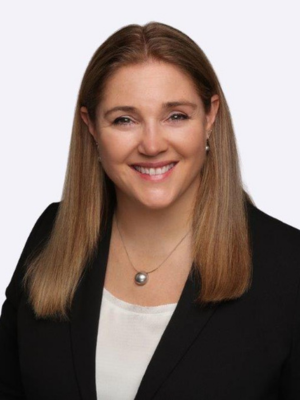 Natalie Gill is responsible for helping drive the continued evolution of PGIM’s DEI strategy and deepening and broadening diversity partnerships both externally and internally, with a focus on the EMEA region. In addition, she focuses on developing global research and thought leadership to create positive change in the asset management industry.
Natalie Gill is responsible for helping drive the continued evolution of PGIM’s DEI strategy and deepening and broadening diversity partnerships both externally and internally, with a focus on the EMEA region. In addition, she focuses on developing global research and thought leadership to create positive change in the asset management industry.
“I’ve had a varied career, but now, as a DEI executive, my role is about celebrating diversity and amplifying the voices of those who feel unheard or unable to contribute to their full potential, due to cultural or systemic barriers,” says Natalie Gill. “I am motivated by the opportunity to influence change at a larger scale. Whilst my contribution in those moments is seemingly small, I am proud that it helps create a legacy for future generations.”
Charting A New Trajectory
“We’re accustomed to thinking that a successful career in financial services should have a linear, one directional trajectory working up through a hierarchy of corporate titles. But the path to my definition of ‘success’ – career fulfillment –is not always taken by climbing the corporate ladder,” says Gill. “My career has been a wonderful lattice of sideways, upwards and sometimes, even downward moves. Taking ownership of my career in this way has enabled me to build a unique portfolio of skills and expertise, and has ultimately led me to forge a successful, purposeful career doing what I love.”
Some of those career moves were intentional, with a clear objective to broaden her exposure or responsibilities. However, Gill has also allowed her decisions to be influenced by significant life moments. During the first eleven years of her career at Goldman Sachs, Gill’s priority was travel, and she jumped on every opportunity to expand her horizons. Then, with two young children at home, she elected to take a two-and-a-half-year career break. When she returned to the industry, Gill first picked up where she left off with a temporary consulting role at Morgan Stanley, followed by a role in regulatory reform at Deutsche Bank.
“Returning to financial services after a career break offered a pivotal window for me to pause, reflect and ask what I really wanted to be doing with my career. It was either a midlife crisis or an epiphany moment,” she says. “For me, having children really focused my career ambitions because I wanted to do something that would make them proud of me.”
Years earlier, she had encouraged and supported her husband to leave his job in investment banking to realize his ambition to become a firefighter, setting a precedent for making bold career changes. Having studied economics at Newcastle University in England, specializing in the economics of inequality and poverty and development economics, Gill’s passion for fairness, equity and inclusion had been a thread throughout her career.
So, in 2016, she made the decision to step away from financial services to join a gender diversity consultancy. “At the time, the consultancy was working closely with the UK Government’s Equality Office. I found it immensely rewarding, and after three years there, I decided to blend my two areas of expertise – DEI and financial services.” This led Gill to move back into the financial services industry as a DEI practitioner in 2019, most recently joining PGIM in her current role in 2022.
Why Being “Invested” Matters in DEI
“For me, the role of DEI is a vocational one,” says Gill. “If companies want to remain successful in the future, they can’t have a culture where everyone thinks the same and agrees with each other. We need alternative perspectives and different ways of thinking to innovate and deliver the best solutions for our clients. And I take it seriously that I have a responsibility to support and represent those at work who, perhaps, don’t feel as heard.”
Gill complements her passion for DEI with a love for numbers, enabling her to take a data-driven and evidence-based approach to her work.
“My background in economics has led me to approach DEI more systematically perhaps than those who have come to the profession through a more traditional route. I see data as critical to evidencing areas of inequity and accelerating change. It’s particularly important in the DEI sphere to remind people of the potential business outcomes and to measure progress and impact,” she says.
Compared to other DEI roles she’s held, her role at PGIM is both employee- and industry-focused. Part of her responsibility is to ensure the company culture is inclusive and enables all employees to thrive. Another piece is leveraging the opportunity for PGIM to play a role in driving change in the industry.
“Currently, we are operating in a fairly polarized environment around the world when it comes to diversity, equity and inclusion, which extends to the workplace. Given my global role, it’s imperative for me to have a deep understanding of industry, society and legal standards on DEI in every region we operate in,” says Gill. “For example, in the UK and Europe, there is an expectation for firms to take greater accountability in driving social change given local governments and regulators have identified a connection between conduct, culture and inclusion.” She continues, “Because of this, the broader impact of DEI becomes far more important as our clients and employees demand more from us.”
Using Your Voice and Broadening Your Perspective
A key part of Gill’s role is to challenge the status quo, to encourage leaders and managers to disrupt their default thinking. She takes a straight-forward, fact-based approach to communicating and tries to challenge people to think differently. But being direct didn’t come naturally. With a Royal Air Force pilot father and a mother who was a teacher, Gill grew up in a family where hierarchy, respect for seniority and deference were instilled. When she first entered the working world, she deferred to titles, but through her experience, she learned that titles and seniority aren’t everything.
“The best leaders are those who recognize you don’t have to be the most senior person in the room to bring valuable insight or perspective that drives change or helps to make the optimum decision,” she says. “We’re all here because we have a role to play and a level of expertise in a particular area. Part of my journey has been overcoming my discomfort when faced with resistance and instead, learning how I can better use my knowledge and expertise to address the differing perspectives in a room and influence people to see DEI as a business imperative.”
Gill’s learning curve has been building up a strong support network for a role that spans the organization and beyond. “Driving inclusive culture change touches every part of the organization, so you can’t do it on your own,” notes Gill. “So, taking the time to build the network of people who can support you is important.”
Inspired from the idea of creating your personal boardroom from Zella King and Amanda Scott, Gill identified the six to twelve people that will most help her to succeed in her role. For example, she seeks guidance from friends and mentors who she knows will challenge her thinking, highlight her blind spots and help strengthen her resolve. She also regularly leverages the opportunities to expand her perspective and circle.
“When I have the opportunity to go out and mix, either at an internal function or an external event, I actively and intentionally speak to people who I wouldn’t ordinarily know,” she says. “Sometimes you have to overcome the tendency to sit in safety and familiarity because building a valuable network is about breaking out of your comfort zone and putting yourself in a position to meet people who maybe have different experiences and backgrounds than you.”
How Different Experiences Inform Your Leadership
Gill’s work experiences at different organizations have been a boon to her success. Over the last 20-plus years, she has worked for British, American, German, Spanish and Japanese organizations, and each has had different systems, approaches, processes and cultural nuances, giving rise to different perspectives. Working across multiple geographical regions, she’s also gained insight into translating her message, so it lands effectively for a given audience.
Regardless of whether someone moves firms or stays within the same, one of the biggest experiences she learned from is having different managers.
“We talk a lot about what ‘good’ leadership is and how it should be role-modelled by the most senior people in our organizations. However, we’re most impacted in our day-to-day by our immediate managers and the people we work most closely with. Throughout my career, I’ve probably learned as much from poor managers about how I don’t want to behave as a leader as from those who were better at it.”
Several years ago, a respected manager imparted on Gill that their job was not to be the loudest voice in the room – but to amplify and curate the voices of everybody else in the room. Gill embraced this approach to leadership and believes that the best gauge for her success is whether the people around her are succeeding. This, she says, comes down to the privilege of being in a position where you can choose to create positive impact for others.
“To me, it’s not about how or why you are in a position of leadership. It’s about how you choose to use that privilege – recognizing, in the moment, where and how you’re able to positively support and influence other people’s careers,” she notes. “My success, as a leader, is about leveraging my privilege to uplift others—acknowledging different perspectives, viewpoints, and experiences.”
Taking Ownership of Your Journey
Gill emphasizes taking ownership of your own career, which includes seeking out people who inspire you to learn more. Rather than waiting on a formal mentor program, actively reach out to people who spark your interest and grow your own network.
“Too often, I see colleagues wait to be assigned a mentor through a random matching process. There’s much more to be gained from identifying someone who inspires you and reaching out to them directly. If you tell someone that you’re fascinated by the work they do, and you’d like fifteen minutes to learn more about what they do and how they got there, it’s incredibly rare for that person to say ‘no.’ If they do, it’s likely due to time constraints,” she notes. “Yet, we’re quite reticent, and maybe even more so culturally here in England, to knock on someone’s door and ask.”
The notion of taking control of and shaping your own career is one that Gill imparts to the many young people she mentors, including her own children. “I’m proud that my children have seen, firsthand, that it’s possible to pivot mid-career to get fulfillment. I hope they will be inspired to take similar action to achieve a sense of purpose in their own careers when the time comes.”
“Whether you opt for a more traditional ladder or a broader lattice of work experiences, it’s also important to find time to recharge. Early on, one of my closest mentors told me that I am solely accountable for the balance between work and the rest of my life.” Gill continues, “In a role like diversity, equity and inclusion, where there is always more to achieve, this can sometimes be difficult to switch off, but I know I am more effective, more influential and more motivated to succeed afterwards.”
In her downtime, Gill likes to stay active with Pilates and a women’s field hockey league. She also enjoys reading psychological thrillers with a traditional English cup of tea.
By Aimee Hansen

